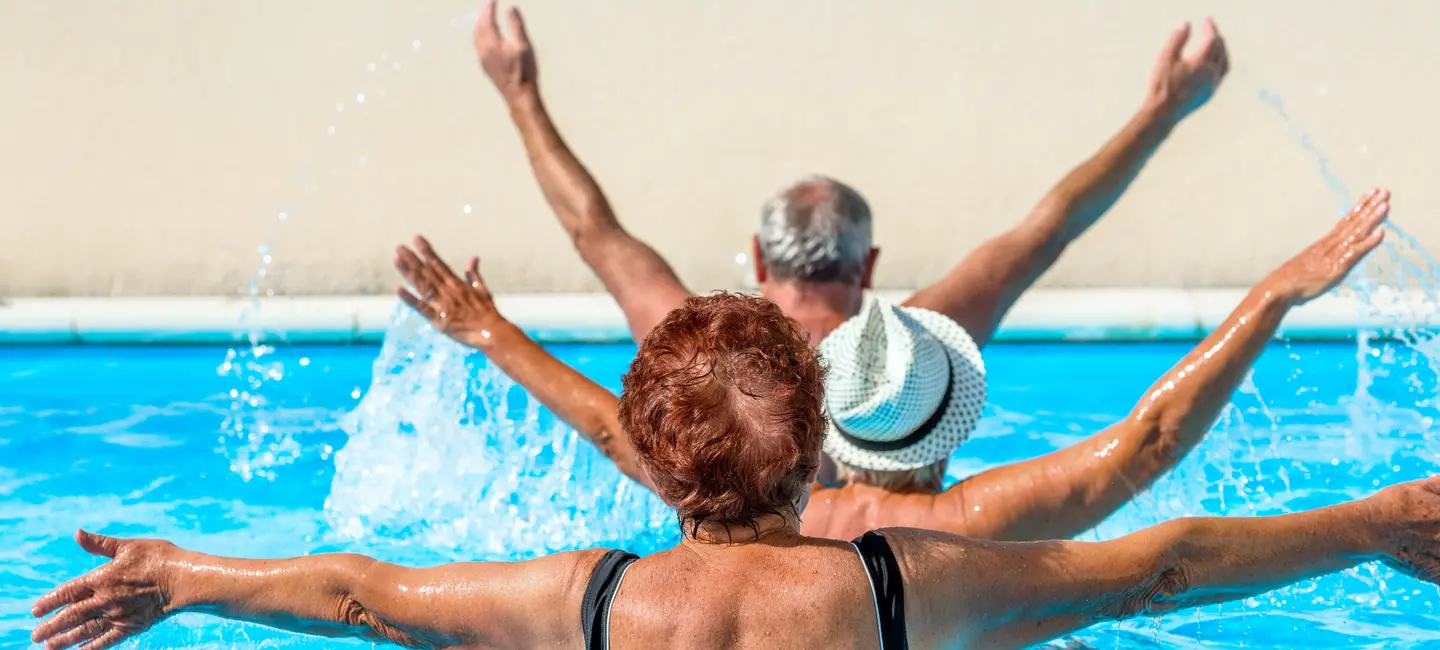
Aquatic exercise is a type of low-impact exercise that is done in water.
Aquatic exercise is most commonly used for pain-related conditions such as arthritis and back pain. It is also used for fibromyalgia, a lung disease that makes it harder to breathe (chronic obstructive pulmonary disease or COPD), and other conditions, but there is no good scientific evidence to support these uses.
Is It Effective?
NatMed Pro rates effectiveness based on scientific evidence according to the following scale: Effective, Likely Effective, Possibly Effective, Possibly Ineffective, Likely Ineffective, Ineffective, and Insufficient Evidence to Rate.
- Back pain. Aquatic exercise seems to improve pain and physical function in people with low back pain. It might even work better than land exercise.
- Osteoarthritis. Aquatic exercise seems to reduce pain and slightly improve disability and quality of life in people with osteoarthritis. It seems work as well as exercise on land. But some people with osteoarthritis prefer aquatic exercise.
- Rheumatoid arthritis (RA). Aquatic exercise seems to improve motion, joint tenderness, and symptom severity in people with RA.
There is interest in using aquatic exercise for a number of other purposes, but there isn't enough reliable information to say whether it might be helpful.
Is it Safe?
Aquatic exercise is exercise in water. The water provides resistance. This might help build muscles. Exercising in water is also low-impact. This might make it less painful for people with pain or difficulty moving.
Aquatic exercise is LIKELY SAFE when used appropriately and short-term. Water exercises have been performed safely for up to 12 weeks. Side effects are rare but might include dizziness, fatigue, and muscle pain.
Special Precautions & Warnings:
Pregnancy: Aquatic exercise is POSSIBLY SAFE when used appropriately during pregnancy. Aquatic exercise seems safe when practiced for up to 45 minutes in water that is not too hot. But aquatic exercise that involves exposure to hot temperatures is POSSIBLY UNSAFE during pregnancy.
Breast-feeding: Not enough is known about the use of aquatic exercise during breast-feeding. But there is no reason to expect any adverse effects.
Heart disease: There is some concern that aquatic exercise in warm or hot water might worsen heart problems. Hot water can increase heart rate and decreased blood pressure. Use caution or avoid aquatic exercise that involves hot water in people with heart problems.
Low blood pressure: Immersion in hot water might decrease blood pressure. Aquatic exercise in hot water might increase the risk of blood pressure becoming too low in people with this condition.
It is not known if this treatment interacts with any medicines. Before using this treatment, talk with your health professional if you take any medications.
There are no known interactions with herbs and supplements.
There are no known interactions with foods.
Ai Chi, Aqua Lymphatic Therapy, Aquatic Physical Therapy, Hydrotherapy, Motion-Based Hydrotherapy, Physiothérapie Aquatique, Pool Therapy, Thérapie Aqua-Lymphatique, Thérapie Physique Aquatique.
Information on this website is for informational use only and is not intended to replace professional medical advice, diagnosis, or treatment. While evidence-based, it is not guaranteed to be error-free and is not intended to meet any particular user’s needs or requirements or to cover all possible uses, safety concerns, interactions, outcomes, or adverse effects. Always check with your doctor or other medical professional before making healthcare decisions (including taking any medication) and do not delay or disregard seeking medical advice or treatment based on any information displayed on this website.
© TRC Healthcare 2024. All rights reserved. Use and/or distribution is permitted only pursuant to a valid license or other permission from TRC Healthcare.
